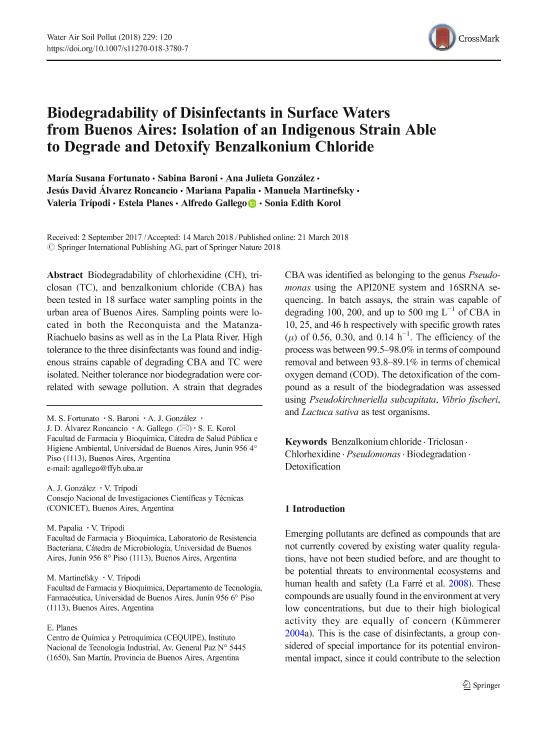Artículo
Biodegradability of Disinfectants in Surface Waters from Buenos Aires: Isolation of an Indigenous Strain Able to Degrade and Detoxify Benzalkonium Chloride
Fortunato, María Susana; Baroni, Sabina; González, Ana Julieta ; Álvarez Roncancio, Jesús David; Papalia, Mariana Andrea
; Álvarez Roncancio, Jesús David; Papalia, Mariana Andrea ; Martinefski, Manuela Romina
; Martinefski, Manuela Romina ; Tripodi, Valeria Paula
; Tripodi, Valeria Paula ; Planes, Estela; Gallego, Alfredo; Korol, Sonia Edith
; Planes, Estela; Gallego, Alfredo; Korol, Sonia Edith
 ; Álvarez Roncancio, Jesús David; Papalia, Mariana Andrea
; Álvarez Roncancio, Jesús David; Papalia, Mariana Andrea ; Martinefski, Manuela Romina
; Martinefski, Manuela Romina ; Tripodi, Valeria Paula
; Tripodi, Valeria Paula ; Planes, Estela; Gallego, Alfredo; Korol, Sonia Edith
; Planes, Estela; Gallego, Alfredo; Korol, Sonia Edith
Fecha de publicación:
04/2018
Editorial:
Springer
Revista:
Water, Air and Soil Pollution
ISSN:
0049-6979
Idioma:
Inglés
Tipo de recurso:
Artículo publicado
Clasificación temática:
Resumen
Biodegradability of chlorhexidine (CH), triclosan (TC), and benzalkonium chloride (CBA) has been tested in 18 surface water sampling points in the urban area of Buenos Aires. Sampling points were located in both the Reconquista and the Matanza-Riachuelo basins as well as in the La Plata River. High tolerance to the three disinfectants was found and indigenous strains capable of degrading CBA and TC were isolated. Neither tolerance nor biodegradation were correlated with sewage pollution. A strain that degrades CBA was identified as belonging to the genus Pseudomonas using the API20NE system and 16SRNA sequencing. In batch assays, the strain was capable of degrading 100, 200, and up to 500 mg L−1 of CBA in 10, 25, and 46 h respectively with specific growth rates (μ) of 0.56, 0.30, and 0.14 h−1. The efficiency of the process was between 99.5–98.0% in terms of compound removal and between 93.8–89.1% in terms of chemical oxygen demand (COD). The detoxification of the compound as a result of the biodegradation was assessed using Pseudokirchneriella subcapitata, Vibrio fischeri, and Lactuca sativa as test organisms.
Archivos asociados
Licencia
Identificadores
Colecciones
Articulos(OCA HOUSSAY)
Articulos de OFICINA DE COORDINACION ADMINISTRATIVA HOUSSAY
Articulos de OFICINA DE COORDINACION ADMINISTRATIVA HOUSSAY
Citación
Fortunato, María Susana; Baroni, Sabina; González, Ana Julieta; Álvarez Roncancio, Jesús David; Papalia, Mariana Andrea; et al.; Biodegradability of Disinfectants in Surface Waters from Buenos Aires: Isolation of an Indigenous Strain Able to Degrade and Detoxify Benzalkonium Chloride; Springer; Water, Air and Soil Pollution; 229; 4; 4-2018; 1-14
Compartir
Altmétricas



